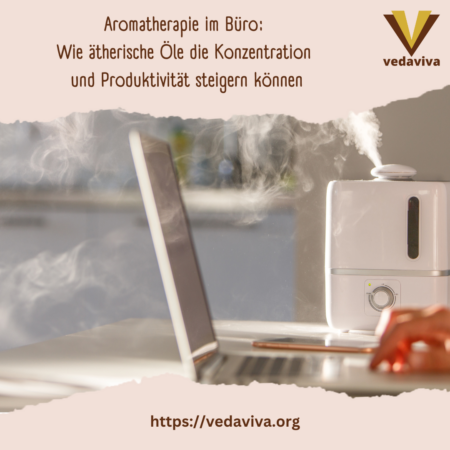Use of fragrances to improve concentration and productivity
In today's hectic work environment, many people are looking for methods to be more focused and productive. Aromatherapy is a technique that is often overlooked. In the office, you can boost your performance by strategically using scents to improve the atmosphere in which you work and you will achieve better concentration and increased productivity, and may even make your colleagues happy. Find out how aromatherapy works in the workplace and which essential oils are best suited.
Aromatherapy: what is it?
Aromatherapy, which uses plant-based essential oils, is a holistic treatment technique that promotes both mental and physical health. This therapy utilises the healing properties of essential oils, which are either applied topically to the skin or inhaled. By inhaling the oils, the scent molecules are transported to the brain's limbic system, which plays an important role in controlling memories, emotions and certain behaviours. In this way, aromatherapy can help to reduce stress, improve mood and increase general well-being and it can increase concentration and productivity.
The benefits of aromatherapy in the workplace
- Promotes concentration: Some fragrances, including rosemary and peppermint, are said to promote alertness and mental clarity.
- Stress reduction: Camomile and lavender contribute to a calm and stress-free working environment.
- Brightens the mood: The flavours of citrus fruits such as lemon and orange can lift the mood and promote general well-being.
- Increased productivity: Better concentration and a more cheerful disposition can lead to a significant increase in productivity.
The top-rated essential oils for the office are:
- Peppermint: Helps relieve headaches, mental clarity, and can increase concentration and productivity.
- Rosemary: Excellent for problem solving and creative endeavours, improves memory and cognitive function.
- Lavender: Calms and relieves tension and is therefore ideal for busy days or after demanding meetings.
- Lemon: energises and lifts the spirit, perfect for a busy morning.
- Eucalyptus: Especially during cold and flu season, this plant helps with breathing and promotes mental clarity.
Aromatherapy in the workplace
Your concentration, productivity and general well-being can be significantly enhanced by incorporating aromatherapy into your regular work programme. To achieve these positive effects, you can use the following three strategies to utilise essential oils in your office:
Diffuser:
A diffuser is an excellent tool for evenly distributing essential oils in a room. By releasing tiny particles of the oils into the air using ultrasonic technology or by heating them slightly, it ensures that the aroma is distributed continuously and evenly throughout the room. This creates a pleasant and soothing atmosphere that not only enhances well-being, but also promotes concentration and productivity. The diffuser also ensures that the positive effects of the essential oils last for a longer period of time, making it an indispensable tool in the office.
The advantages of a diffuser include
Easy to use: Simply place the diffuser on your desk, add some water and essential oil drops and switch it on.
The effect lasts a long time: Diffusers can be in use for several hours, so you get a continuous aromatherapy treatment while you work.
Visual enhancement: Many diffusers are also visually attractive and can be used as a decorative element at your workplace.
Room spray for the office:
A quick and easy way to scent your workspace is with a room spray. It is quick to prepare and gives you the freedom to use the fragrance whenever you need it. You can decide whether you need the room spray for better concentration or for more relaxed working.
Production of a room spray:
Pour some water into a small spray bottle.
Add a few drops of your favourite essential oil.
To distribute the oils evenly, shake the bottle vigorously before each use.
Application tips for the office:
Spray the room spray into the air or onto fabrics such as office chairs or curtains as required.
When attending difficult meetings, diffuse relaxing aromas such as lavender or invigorating ones such as lemon and peppermint to improve concentration, this can also help to clear the room of emotional tension.
Sticks for inhalation
If using a diffuser is not possible or you are travelling, inhalation sticks are very useful. These compact, travel-friendly sticks with essential oils allow for instant inhalation.
Advantages of inhalation sticks:
- Mobility: The sticks can be taken with you when travelling and are therefore perfect for business trips or when you need a little pick-me-up or a concentration boost in between.
- Caution is advised: Inhalation sticks are discreet and can be used anytime and anywhere without disturbing other people.
- Targeted effect: The essential oils reach your body quickly and effectively through direct inhalation.
Application tips:
Open the stick, place it on your nose and take a few deep breaths.
For an instant boost in alertness and clarity, as well as better concentration, use eucalyptus or peppermint essential oil.
Useful advice on aromatherapy:
- Choose high-quality oils: Look for genuine essential oils that do not contain any artificial ingredients.
- Pay attention to the dosage - less is often more. Fragrances that are too strong can be distracting.
- Think about your work colleagues: Not everyone has the same taste in fragrances. If necessary, hold a team meeting about the use of essential oils.
- Mix fragrances: Try out several fragrance blends to find out which one works best for you.
In the workplace, aromatherapy can be a useful tool for increasing concentration and productivity. By using essential oils strategically, whether with a room spray or an inhalation stick, you can make your workplace more pleasant and effective, creating a better indoor environment. Try it out and see for yourself the positive effect that fragrances can have on your working day.
If you have any questions about aromatherapy or how you can increase your concentration and productivity, please do not hesitate to contact me. Contact or visit me on Instagram
Aromatherapy scientifically explained
Introduction
Aromatherapy, the targeted use of essential oils to promote health and well-being, has become increasingly important in recent years. Especially in everyday office life, where concentration and productivity are crucial, the use of fragrances is being discussed as a potential means of improving performance. This article looks at the scientific findings on aromatherapy and its use in the office.
Scientific principles of aromatherapy
Aromatherapy is based on the use of essential oils, which are extracted from plants and contain a variety of bioactive compounds. These oils can be applied by inhalation, skin contact or oral ingestion. Scientific studies have shown that essential oils can inhibit the growth of pathogens and have positive effects on well-being[4].
Mode of action and effects
The effects of aromatherapy are varied and depend on the specific essential oils. Some of the most common effects include:
- Stress reduction: Lavender oil is known for its calming properties and can help reduce stress and anxiety.
- Increase concentration: Peppermint oil and rosemary oil are known to promote mental clarity and concentration.
- Mood-boosting: Citrus oils such as lemon and orange can lift the mood and give a feeling of freshness and energy[1][2].
Scientific studies and evidence
Numerous studies confirm the positive effects of aromatherapy. A systematic review of the literature shows that essential oils such as lavender and rosemary can improve cognitive performance and well-being. These effects are due to the interaction of the fragrance molecules with the limbic system in the brain, which is responsible for emotions and memory[3].
Challenges and implementation
Despite the positive effects, there are also challenges when implementing aromatherapy in the office. These include:
- Individual preferences: Not every employee reacts the same way to certain fragrances, and some may be sensitive or allergic to certain essential oils.
- Quality of the oils: The effectiveness of aromatherapy depends heavily on the quality of the essential oils used. It is important to use high-quality, natural oils in order to achieve the desired effects[1][5].
Aromatherapy offers a promising opportunity to increase concentration and productivity in the office. The targeted use of essential oils can reduce stress, improve mood and promote mental clarity. However, further research and careful implementation are necessary to achieve the best possible results and take individual needs into account.
Sources:
[1] https://www.stadelmann-verlag.de/buch-at.html
[2] https://jophiel-aromaoele.de/Buecher-Gutschein/
[3] https://www.bibliomed-pflege.de/sp/artikel/36937-aromapflege-in-den-klinikalltag-integrieren
[4] https://www.ifm-herborn.de/aromatogramm
[5] https://www.lehmanns.de/shop/medizin-pharmazie/56438204-9783943793963-aromatherapie-in-wissenschaft-und-praxis



